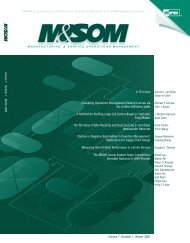Strengthening the Empirical Base of Operations Management
Strengthening the Empirical Base of Operations Management
Strengthening the Empirical Base of Operations Management
You also want an ePaper? Increase the reach of your titles
YUMPU automatically turns print PDFs into web optimized ePapers that Google loves.
Fisher: <strong>Streng<strong>the</strong>ning</strong> <strong>the</strong> <strong>Empirical</strong> <strong>Base</strong> <strong>of</strong> <strong>Operations</strong> <strong>Management</strong><br />
380 Manufacturing & Service <strong>Operations</strong> <strong>Management</strong> 9(4), pp. 368–382, © 2007 INFORMS<br />
for providing maximum variety to customers while<br />
retaining less variety in plants. We also learned that<br />
many functional components could be rank ordered<br />
on a single quality metric. Brakes are an example,<br />
where <strong>the</strong> metric is stopping power. One could support<br />
an entire product line with a single brake type if<br />
it had <strong>the</strong> powerto stop <strong>the</strong> heaviest carin <strong>the</strong> line<br />
within a requisite distance, but <strong>the</strong> per unit production<br />
cost <strong>of</strong> this brake would be inordinately high for<br />
smaller cars. Conversely, you could minimize per unit<br />
production costs by having a unique brake for each<br />
car, but this would result in high plant complexity<br />
costs.<br />
We <strong>the</strong>n sought a principle that would guide our<br />
subsequent research and showed, for a stylized version<br />
<strong>of</strong> <strong>the</strong> problem, that <strong>the</strong> number <strong>of</strong> brakes that<br />
minimizes perunit production costs and <strong>the</strong> cost <strong>of</strong><br />
plant complexity from a greater number <strong>of</strong> brakes<br />
could be found via a model that resembled <strong>the</strong> economic<br />
order quantity model. From this we hypo<strong>the</strong>sized<br />
that <strong>the</strong> number<strong>of</strong> brakes an auto company<br />
would create to support a given product line would<br />
depend on factors such as <strong>the</strong> number <strong>of</strong> cars in <strong>the</strong><br />
line, <strong>the</strong> variance in weight <strong>of</strong> those cars, and <strong>the</strong>ir<br />
production volumes. We <strong>the</strong>n moved to <strong>the</strong> upperright<br />
cell to verify <strong>the</strong>se hypo<strong>the</strong>ses by analyzing a<br />
database assembled fora large number<strong>of</strong> auto companies<br />
using public data on auto specifications and<br />
production volumes and data provided as a service<br />
to salvage yards that showed commonality <strong>of</strong> brakes<br />
across cars. Finally, we moved to <strong>the</strong> upper-left cell by<br />
formulating and analyzing a model for determining<br />
<strong>the</strong> optimal number and type <strong>of</strong> brakes to support a<br />
defined product line.<br />
The approaches to research outlined here might be<br />
contrasted with a more common one <strong>of</strong> reading a<br />
paperin a journal and identifying a variant <strong>of</strong> it to<br />
be analyzed. While much good research falls in this<br />
category—and it’s fine to have this as part <strong>of</strong> a portfolio,<br />
if that’s all we do—we would be at risk, in<br />
von Neuman’s words, to “separate into a multitude <strong>of</strong><br />
insignificant branches.”<br />
9. Conclusions and Some Suggested<br />
Action Steps<br />
I have suggested that <strong>the</strong> field <strong>of</strong> operations management<br />
can benefit from streng<strong>the</strong>ning its empirical<br />
dimension. As evidence, I have <strong>of</strong>fered <strong>the</strong> examples<br />
<strong>of</strong> physics, medicine, and finance, all <strong>of</strong> which have a<br />
strong empirical tradition and are prospering. Moreover,<br />
<strong>the</strong>se fields provide role models for how empirical<br />
research should be conducted, which I have<br />
attempted to summarize in this paper.<br />
Some advantages <strong>of</strong> a strong empirical component<br />
to our research include <strong>the</strong> following:<br />
1. Identifying and verifying important phenomena<br />
2. Identifying and characterizing important questions<br />
on which we can do useful research<br />
3. Validating models and assumptions that we have<br />
made<br />
4. Establishing <strong>the</strong> relevance <strong>of</strong> our research by<br />
demonstrating how <strong>the</strong> research outputs apply to<br />
practice.<br />
If you agree with <strong>the</strong>se assertions, <strong>the</strong>n a natural<br />
question is what action steps should be taken. We can<br />
separate actions into those to be taken by individuals,<br />
academic departments, and pr<strong>of</strong>essional societies.<br />
As an individual, you could, I hope, considerei<strong>the</strong>r<br />
adding an empirical component to your own research<br />
portfolio orcontinuing yourempirical research if<br />
you already do it. Academic departments can considerdevoting<br />
some <strong>of</strong> <strong>the</strong>irhiring slots to faculty<br />
doing empirical research, introducing courses on<br />
empirical research into <strong>the</strong>ir PhD programs (<strong>the</strong> PhD<br />
course <strong>Empirical</strong> Research in <strong>Operations</strong> <strong>Management</strong><br />
designed and taught by Christian Terwiesch in <strong>the</strong><br />
<strong>Operations</strong> and Information <strong>Management</strong> Department<br />
at <strong>the</strong> Wharton School is one example) and giving<br />
PhD students a clinical experience via working on<br />
research projects within companies. A more ambitious<br />
goal would be to create more institutionalized<br />
opportunities for a clinical experience that might constitute<br />
a “teaching hospital” foroperations management.<br />
Some interesting initiatives in this direction<br />
are <strong>the</strong> internships provided within <strong>the</strong> MIT Leaders<br />
for Manufacturing program and <strong>the</strong> University<br />
<strong>of</strong> Michigan Manufacturing Applications Project program,<br />
in which faculty work with students on field<br />
projects with companies.<br />
There is also a huge leadership opportunity for pr<strong>of</strong>essional<br />
societies such as <strong>the</strong> Institute for<strong>Operations</strong><br />
Research and <strong>the</strong> <strong>Management</strong> Sciences (INFORMS)<br />
and <strong>the</strong> Production and <strong>Operations</strong> <strong>Management</strong> Society<br />
(POMS). Clearly, publication <strong>of</strong> empirical research




